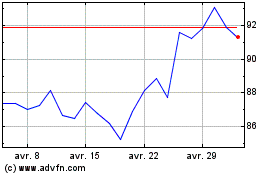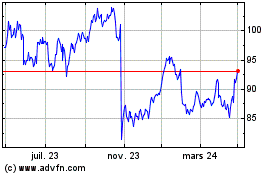Press Release: Sarclisa recommended for EU approval by the CHMP to
treat transplant-ineligible newly diagnosed multiple myeloma
Sarclisa recommended for EU approval by the
CHMP to treat transplant-ineligible newly diagnosed multiple
myeloma
- Recommendation based on IMROZ phase
3 study demonstrating Sarclisa in combination with VRd
significantly improved progression-free survival, compared to
standard-of-care VRd alone
- If approved, Sarclisa would be the
first anti-CD38 therapy in the EU available for use in combination
with VRd for adult patients with transplant-ineligible NDMM
Paris, November 14, 2024. The European Medicines
Agency (EMA)’s Committee for Medicinal Products for Human Use
(CHMP) has adopted a positive opinion recommending the approval of
Sarclisa in combination with bortezomib, lenalidomide, and
dexamethasone (VRd) for the treatment of adult patients with newly
diagnosed multiple myeloma (NDMM) who are ineligible for autologous
stem cell transplant (ASCT). A final decision is expected in the
coming months.
Dietmar Berger, M.D.,
Ph.D.
Chief Medical Officer, Global Head of Development at Sanofi
“The positive CHMP opinion is an important step forward for
people with transplant-ineligible newly diagnosed multiple myeloma
for whom effective front-line therapy may improve long-term
outcomes. If approved, this Sarclisa-based combination could
establish a new standard-of-care treatment approach for patients in
the EU, helping to address a critical care gap in multiple myeloma
treatment, and reinforcing Sarclisa’s potential as the anti-CD38
therapy of choice.”
In September 2024, the US Food and Drug
Administration (FDA) approved Sarclisa in combination with VRd for
the treatment of adult patients with NDMM who are not eligible for
ASCT, representing the first global approval for Sarclisa in the
first line setting. In addition, the FDA granted orphan drug
exclusivity for Sarclisa in the approved indication.
Sarclisa is currently approved in two
indications for the treatment of certain adult patients with
relapsed or refractory MM in more than 50 countries, including the
US and EU.
First positive global phase 3 study
combining anti-CD38 therapy with VRd to significantly improve PFS
versus VRd alone in transplant-ineligible NDMM supports CHMP
decision
The positive CHMP opinion is based on data from the IMROZ phase 3
study, which was presented at the American Society of Clinical
Oncology 2024 annual meeting, European Hematology Association 2024
meeting, and published in The New England Journal of
Medicine. IMROZ is the first global phase 3 study of a CD38
monoclonal antibody in combination with standard-of-care VRd to
significantly improve progression-free survival (PFS) versus VRd
alone. The safety and tolerability of Sarclisa observed was
consistent with the established safety profile of Sarclisa and VRd
with no new safety signals.
About Sarclisa
Sarclisa (isatuximab) is a CD38 monoclonal antibody that binds to a
specific epitope on the CD38 receptor on MM cells, inducing
distinct antitumor activity. It is designed to work through
multiple mechanisms of action including programmed tumor cell death
(apoptosis) and immunomodulatory activity. CD38 is highly and
uniformly expressed on the surface of MM cells, making it a target
for antibody-based therapeutics such as Sarclisa. In the US, the
non-proprietary name for Sarclisa is isatuximab-irfc, with irfc as
the suffix designated in accordance with nonproprietary naming of
biological products guidance for industry issued by the US FDA.
Currently Sarclisa is approved in more than 50
countries, including the US and EU, across two indications;
Sarclisa is approved under an additional indication in the US. In
Europe, based on the ICARIA-MM phase 3 study, Sarclisa is approved
in combination with pomalidomide and dexamethasone for the
treatment of patients with relapsed refractory MM (RRMM) who have
received ≥2 prior therapies, including lenalidomide and a
proteasome inhibitor and who progressed on last therapy. Based on
the IKEMA phase 3 study, Sarclisa is also approved in 50 countries
in combination with carfilzomib and dexamethasone, including in the
US for the treatment of patients with RRMM who have received 1–3
prior lines of therapy and in the European Union for patients with
MM who have received at least 1 prior therapy. In the US, Sarclisa
is also approved in combination with VRd as a first line treatment
option for adult patients with NDMM who are not eligible for ASCT,
based on the IMROZ phase 3 study.
Sanofi continues to advance Sarclisa as part of
a patient-centric clinical development program, which includes
several phase 2 and phase 3 studies across the MM treatment
continuum spanning six potential indications. In addition, the
company is evaluating a subcutaneous administration method for
Sarclisa in clinical studies. The safety and efficacy of Sarclisa
has not been evaluated by any regulatory authority outside of its
approved indications and methods of delivery.
In striving to become the number one
immunoscience company globally, Sanofi remains committed to
advancing oncology innovation. Through focused strategic decisions
the company has reshaped and prioritized its pipeline, leveraging
its expertise in immunoscience to drive progress. Efforts are
centered on difficult-to-treat cancers such as select hematologic
malignancies and solid tumors with critical unmet needs, including
multiple myeloma, acute myeloid leukemia, certain types of
lymphomas, as well as gastrointestinal and lung cancers.
For more information on Sarclisa clinical
studies, please visit www.clinicaltrials.gov.
About Sanofi
We are an innovative global healthcare company, driven by one
purpose: we chase the miracles of science to improve people’s
lives. Our team, across the world, is dedicated to transforming the
practice of medicine by working to turn the impossible into the
possible. We provide potentially life-changing treatment options
and life-saving vaccine protection to millions of people globally,
while putting sustainability and social responsibility at the
center of our ambitions.
Sanofi is listed on EURONEXT: SAN and NASDAQ:
SNY
Media Relations
Sandrine Guendoul | + 33 6 25 09 14 25
| sandrine.guendoul@sanofi.com
Evan Berland | +1 215 432 0234 |
evan.berland@sanofi.com
Nicolas Obrist | + 33 6 77 21 27 55 |
nicolas.obrist@sanofi.com
Victor Rouault | + 33 6 70 93 71 40
| victor.rouault@sanofi.com
Timothy Gilbert | + 1 516 521 2929 |
timothy.gilbert@sanofi.com
Investor Relations
Thomas Kudsk Larsen |+ 44 7545 513 693 |
thomas.larsen@sanofi.com
Alizé Kaisserian | + 33 6 47 04 12 11 |
alize.kaisserian@sanofi.com
Arnaud Delépine | + 33 6 73 69 36 93 |
arnaud.delepine@sanofi.com
Felix Lauscher | + 1 908 612
7239 | felix.lauscher@sanofi.com
Keita Browne | + 1 781 249 1766 |
keita.browne@sanofi.com
Nathalie Pham | + 33 7 85 93 30 17 |
nathalie.pham@sanofi.com
Tarik Elgoutni | + 1 617 710 3587 |
tarik.elgoutni@sanofi.com
Thibaud Châtelet | + 33 6 80 80 89 90 |
thibaud.chatelet@sanofi.com
Sanofi Forward-Looking
Statements
This press release contains forward-looking statements as
defined in the Private Securities Litigation Reform Act of 1995, as
amended. Forward-looking statements are statements that are not
historical facts. These statements include projections and
estimates regarding the marketing and other potential of the
product, or regarding potential future revenues from the product.
Forward-looking statements are generally identified by the words
“expects”, “anticipates”, “believes”, “intends”, “estimates”,
“plans” and similar expressions. Although Sanofi’s management
believes that the expectations reflected in such forward-looking
statements are reasonable, investors are cautioned that
forward-looking information and statements are subject to various
risks and uncertainties, many of which are difficult to predict and
generally beyond the control of Sanofi, that could cause actual
results and developments to differ materially from those expressed
in, or implied or projected by, the forward-looking information and
statements. These risks and uncertainties include among other
things, unexpected regulatory actions or delays, or government
regulation generally, that could affect the availability or
commercial potential of the product, the fact that product may not
be commercially successful, the uncertainties inherent in research
and development, including future clinical data and analysis of
existing clinical data relating to the product, including post
marketing, unexpected safety, quality or manufacturing issues,
competition in general, risks associated with intellectual property
and any related future litigation and the ultimate outcome of such
litigation, and volatile economic and market conditions, and the
impact that pandemics or other global crises may have on us, our
customers, suppliers, vendors, and other business partners, and the
financial condition of any one of them, as well as on our employees
and on the global economy as a whole. The risks and uncertainties
also include the uncertainties discussed or identified in the
public filings with the SEC and the AMF made by Sanofi, including
those listed under “Risk Factors” and “Cautionary Statement
Regarding Forward-Looking Statements” in Sanofi’s annual report on
Form 20-F for the year ended December 31, 2023. Other than as
required by applicable law, Sanofi does not undertake any
obligation to update or revise any forward-looking information or
statements.
All trademarks mentioned in this press
release are the property of the Sanofi group.


Sanofi (EU:SAN)
Graphique Historique de l'Action
De Nov 2024 à Déc 2024

Sanofi (EU:SAN)
Graphique Historique de l'Action
De Déc 2023 à Déc 2024
